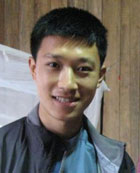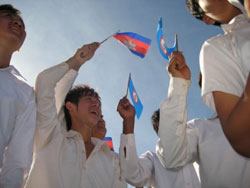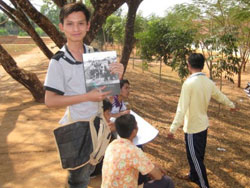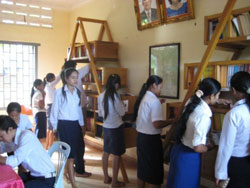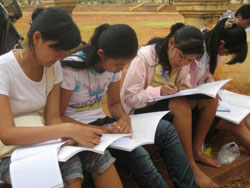 |
|||||||||||
| Undergraduate Academic Affairs Home | News | Make a Gift | UW Alumni | |||||||||||
|
April 2009 | Return to issue home
Hardest Job He's Ever Loved:
For the third consecutive year, the University of Washington leads U.S. universities in the number of alumni serving as Peace Corps volunteers. One such alumnus is James Hong, '06, Mary Gates Scholar, undergraduate researcher and former staff member of the Undergraduate Research Program in UAA’s Center for Experiential Learning. James began his Peace Corps service last July and after his 10-week training began working at his site in Memot, Cambodia. In Memot, James teaches English, computer skills and promotes a culture of discovery in a country whose educational system was all but destroyed under the Khmer Rouge. James updates friends and family on his experiences; the following are a few excerpts about his day-to-day life and work. July 2008: Just after arrival in Cambodia, during training This will truly be the hardest job I've ever loved. October 2008: In Memot, James’ volunteer site, post training Overall—even considering the past two weeks—this has been a very positive experience. I've definitely learned a lot, and have come to appreciate a lot. I think my ups will outweigh my downs. And like I mentioned, the longer I'm here, the easier it will become.
December 2008: Library hours in Memot
March 2009: Women's Rights For many girls, obtaining an education is pretty low in the list of priorities. Most girls have to stay home to help their parents with household chores, work in the market, farms, factories, etc. This extra burden prevents many from attending school regularly (especially if they are old enough to work), let alone attend private classes (which is basically required if you want to succeed in school). If a family has to decide between a son or a daughter going to school, it will most likely be the son. During International Women's Rights Day, there was an assembly at my school for all the female teachers in Memot District. However, neither male teachers nor students were invited to this celebration. Actually, I don't even know if it were a celebration since I wasn't there. While it's important to empower women to take more control over their lives, this alone will not change the attitude of society. Unless men choose to acknowledge and recognize these important issues for women, it will continue to be an uphill struggle for them. But the idea has been planted in many of the young. Hopefully it will continue to grow. Note: The contents of James’ blog are his personally and do not reflect any position of the U.S. government or the Peace Corps. April 2009 | Return to issue home | |||||||||||
|
|||||||||||
